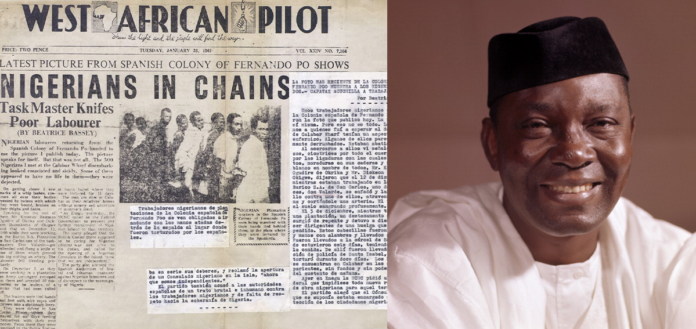INTRODUCTION
One of the products of Western education is Nnamdi Azikiwe. He returned from overseas and was determined to fight colonialism through the muzzle of journalism. The West African Pilot was the medium he used to register his misgivings against colonialism as well as rediscover the lost consciousness of the African personality in the grip of colonial powers.
Establishment of the West African Pilot (1937)
According to Fred Omu, “in November, 1937 Nnamdi Azikiwe started the West African Pilot, which immediately became the major forum of the increased nationalist consciousness which had been awaiting a potent outlet and stimulus.
The Weekly Record had died in 1930, the Daily News had ceased to attract serious attention by 1934 and the mid-30s; therefore, no newspaper existed to crystallize and channelize the-growing nationalist influences of the late inter-war years.
The West African Pilot stepped into the void and with Azikiwe’s admission to membership of the Nigerian Youth Movement and his election to the Central Executive Committee of the Movement, a new era of politics and nationalism was born. Azikiwe as an admirer of Thomas H. Jackson brought into Nigeria a new idealism, of nationalism as well as new techniques of political and journalistic propaganda learned during his training and experience in the United States. His initial platform was the African Morning Post, which he edited in Accra for two and half years until he resigned on 1st April, 1937, a week after the West African Court of Appeal allowed his appeal against the judgment of the Supreme Court, which the previous year had convicted him for sedition.
His influence developed in Lagos with the incorporation of the Zik Press Limited on 5th August and the launching of the Pilot on 12 November. The opening address entitled “The Curtain Rises” described the editorship as “sentinels of popular liberty and guardians of civilization” whose supreme task was to make assertions in unequivocal terms.
Editorial Policy of the Pilot
According to Azikiwe in My odyssey: “I had christened the new daily paper West African Pilot, and chose Dante Alighieri’s immortal lines as its motto: show the light and the people will find the way”. The duty of a pilot was to guide the ship entrusted to his care and I thought that, at the stage in the development of my country, it was not the duty of any patriot to pontificate. It was incumbent on me to turn the searchlight of publicity, in the form of narration or exposition or; description or argumentation, on the courses of action affecting my country directly or indirectly, leading people to decide for themselves what attitude to adopt and what action to take, under such guidance.
Pilot and Its Contributions
The West African Pilot made immense contributions to the growth and development of Nigerian press. The contribution cut across various areas of life, chief among which are outlined and discussed below.
1. Business orientations: With the appearance of Zik and the emergence of Pilot in the newspaper scene, newspaper publishing quickly turned out to be a business venture with pilot outlook. Unlike its predecessors, the Pilot and its group made newspaper publication as a purely profit-oriented business. Zik and his paper achieved this singular feat by appointing agencies all over the place with a view to ensuring wide circulation. He also popularised newspaper reading by adding local news menu to attract more readerships.
2. The advent of newspaper chains: At the time Zik launched himself into the newspaper venture, there was no trace of chain in existence, Zik’s arrival in journalism scene brought a new dimension into the profession as he introduced “Newspaper Chains” in Nigeria. Zik’s Group of Newspapers Nigerian Limited had the Pilot as the flag bearer, the Eastern Nigerian Guardian (1940) published in Port Harcourt, Nigerian Spokesman (1943) published in Onitsha, Southern Nigerian
Defender (1943) first launched in Warri and later transferred to Ibadan; The Daily Comet (1949); The Northern Advocate published in Jos and the Sentinel published in Enugu.
Pilot: Awakening Political Consciousness
Zik (supported by Zik’s Group) embarked on publishing and employing the newspaper chain at his disposal to propagate his political ideals and beliefs. Though the papers were independent administratively, they often closed ranks on controversial issues and took the same stand with the Pilot. In this way, the Zik’s family had their influence felt nationwide.
Use of wire service: Another important feature of the Pilot was that it made use of foreign press association starting from 1945. It consequently became the first post war newspaper to make use of the wire services provided by Reuters. This important foresight has turned out to be a common feature with the present day newspaper houses that rely heavily on international wire service for their foreign news.
Note that Zik was a one time Reuter’s correspondent for West Africa.
Pilot: Features Of General Interests
• The Pilot became the first newspaper in Nigeria to introduce columns of general interest such as women’s column; book review, and so on. These columns were meant to lighten the heavy burden imposed on people by politics of the day.
• Introduction of banner headlines: The paper adopted use of banner headlines across the entire pages especially the lead story at the front and “back pages. It also introduced headlines with a verb, for example, “Zik goes to Court.” There were other innovations like proper newspaper planning, pictorial or photo- journalism and other forms of illustrations that metamorphosed into today’s precision journalism.
• Purely indigenous newspapers: Pilot is the first newspaper in the country to be run entirely by Nigerians contrary to its predecessors, which were run wholly or partially by foreigners. Pilot and its founder are by all standards devoid of any foreign interest and influence.
The West African Pilot inculcated in the people the virtues of reading and seeking knowledge through the addition of local, news columns. The objective of the publisher was achieved through wider circulation strategies. This may explain why the paper though it has long disappeared from newsstand has remained indelible in the minds of those who read it.
From the foregoing, we have been able to trace the history of the West African Pilot, its editorial policy, contributions, general features and enhancement of political awareness in the country.




















